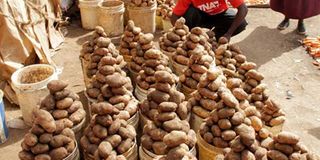Beat low yields with robust Sangi variety

Potatoes on sale in Nakuru. PHOTO | SULEIMAN MBATIAH | FILE
What you need to know:
- The difference between demand for potato seeds has seen the government allow a Dutch company to bring in 39 varieties
Peter Kimani, a potato farmer in Nyandarua, was harvesting five bags of potatoes from his farm per season.
Kimani viewed his two-and-a-half-acre farm he inherited from his parents as a curse. Every season, all he required was a few potatoes, left from the previous harvest, to have the land greened with the low-yielding plants. But help came. The resident of Mawingu Division in Nyandarua County was introduced to clean and certified seeds of the crop.
Through a programme funded by the National Potato Council of Kenya and Commission of Science and Technology, Kimani received three kilos of Sangi potato seeds from the area’s extension officer.
He now enjoys his farming business, and has since graduated to cash crop farming where he plants the Sangi variety and harvests 11 tonnes from a single planting season.
Now he produces his own seeds of the variety that he sells at Sh2,000 per 50kg bag. “The seeds fetch a lot more than the potatoes that I used to spend the whole day selling at the roadside,” he says.
Kimani is one of the 15 farmers in Nyandarua who have embarked on seed multiplication. The current demand for the seeds stands at 60,000 tonnes a year, but all the farmers can manage are 600 tonnes.
“A single harvest fetches an average of Sh500,000 which is far much better than the Sh22,000 that I used to get from the sale of 20 bags two years ago,” Kimani said while addressing a farmers forum recently at Ol Jororok Agricultural Training Centre.
The difference between demand for potato seeds has seen the government allow a Dutch company to bring in 39 varieties, including the recently rolled out Dutch Robjin, although food technologists and breeders warn that this may not adequately solve the problem at hand.
Kenya Agricultural Research Institute Tigoni Centre director Jackson Kabira lauds the speedy move by the government to address the seed shortage but warns that importing seeds is not a lasting solution.
“This is a short cycle crop that only requires three to four months to mature. With proper technology such as Aeroponics, we are certain that the seed problems will be a thing of the past,” says Kabira.
He notes that the country is better placed to multiply its own seeds rather than relying on foreign companies which may demand royalties from breeders to discourage local breeders.
Currently, Nyandarua County has two major seed producers. Suera farm on the outskirts of Nyahururu Town and the National Youth Service grounds in Ol Kalou. This is in addition to Njabini and Ol Jororok agricultural training centres (ATC) that produce seeds on 1,000 acres.
OlJororok’s ATC principal David Kuria says that with proper funding, the centre can triple its seed production to cater for 500 acres in a single season, up from 30 acres.





